Discipleship
SEARCH BY TITLE
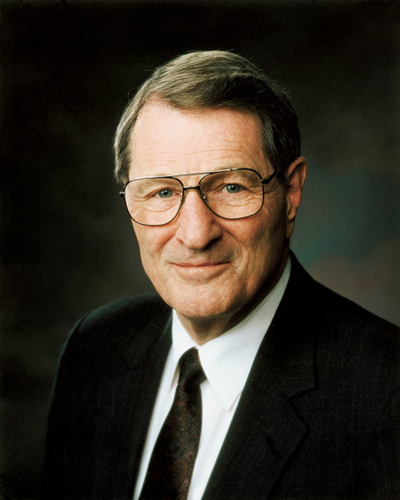 But for a Small Moment
But for a Small Moment
I should like, therefore, to speak to you on the premise that it is a part of discipleship for us to be prepared for the kind of rigors that Jesus always leveled his disciples. He said, “My people must be tried in all things, that they may be prepared to receive the glory that I have for them, even the glory of Zion; and he that will not bear chastisement is not worthy of my kingdom”. That is hard doctrine. Peter made it even more rigorous. Peter didn’t want us to take any credit upon ourselves for the suffering we endure because of our own mistakes. He was willing to see us take credit for the suffering we endure because of discipleship, but not because of our own stupidity or our own sin. Then Moroni reminded us, “For ye receive no witness until after the trial of your faith”. That’s the rigorous path of discipleship, brothers and sisters, about which I wish to speak at least in this one dimension tonight, giving you some examples, if I may. If God chooses to teach us the things we most need to learn because he loves us, and if he seeks to tame our souls and gentle us in the way we most need to be tamed and most need to be gentled, it follows that he will customize the challenges he gives us and individualize them so that we will be prepared for life in a better world by his refusal to take us out of this world, even though we are not of it. In the eternal ecology of things we must pray, therefore, not that things be taken from us, but that God’s will be accomplished through us. What, therefore, may seem now to be mere unconnected pieces of tile will someday, when we look back, take form and pattern, and we will realize that God was making a mosaic. For there is in each of our lives this kind of divine design, this pattern, this purpose that is in the process of becoming, which is continually before the Lord but which for us, looking forward, is sometimes perplexing.
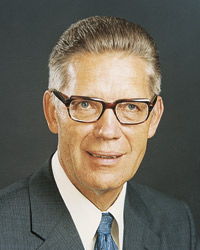 The Caravan Moves On
The Caravan Moves On
This is our goal and aim and purpose in life. Everything we do should please the Lord and further our strivings for salvation. And, the Lord be praised, there comes a time in the lives of faithful Saints when, having kept the faith and been true and faithful at all hazards, the Lord says to them: Thou shalt be exalted. These, then, are a few of the many tests of true discipleship. Now, I have what every true disciple has. It is called the testimony of Jesus. In our day it includes the revealed knowledge that the earthly kingdom—The Church of Jesus Christ of Latter-day Saints—will triumph. In this connection may I set before you this illustration: The Church is like a great caravan—organized, prepared, following an appointed course, with its captains of tens and captains of hundreds all in place. What does it matter if a few barking dogs snap at the heels of the weary travelers? Or that predators claim those few who fall by the way? The caravan moves on. Is there a ravine to cross, a miry mud hole to pull through, a steep grade to climb? So be it. The oxen are strong and the teamsters wise. The caravan moves on. Are there storms that rage along the way, floods that wash away the bridges, deserts to cross, and rivers to ford? Such is life in this fallen sphere. The caravan moves on. Ahead is the celestial city, the eternal Zion of our God, where all who maintain their position in the caravan shall find food and drink and rest. Thank God that the caravan moves on!
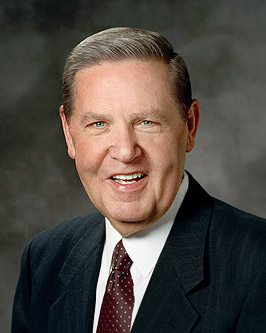 The Cost – and Blessings – of Discipleship
The Cost – and Blessings – of Discipleship
And therein lies a message for every young man and young woman in this Church. You may wonder if it is worth it to take a courageous moral stand in high school or to go on a mission only to have your most cherished beliefs reviled or to strive against much in society that sometimes ridicules a life of religious devotion. Yes, it is worth it, because the alternative is to have our “houses” left unto us “desolate”—desolate individuals, desolate families, desolate neighborhoods, and desolate nations. So here we have the burden of those called to bear the messianic message. In addition to teaching, encouraging, and cheering people on (that is the pleasant part of discipleship), from time to time these same messengers are called upon to worry, to warn, and sometimes just to weep (that is the painful part of discipleship). . . Friends, especially my young friends, take heart. Pure Christlike love flowing from true righteousness can change the world. I testify that the true and living gospel of Jesus Christ is on the earth and you are members of His true and living Church, trying to share it. I bear witness of that gospel and that Church, with a particular witness of restored priesthood keys which unlock the power and efficacy of saving ordinances. I am more certain that those keys have been restored and that those ordinances are once again available through The Church of Jesus Christ of Latter-day Saints than I am certain I stand before you at this pulpit and you sit before me in this conference. Be strong. Live the gospel faithfully even if others around you don’t live it at all. Defend your beliefs with courtesy and with compassion, but defend them. A long history of inspired voices, including those you will hear in this conference and the voice you just heard in the person of President Thomas S. Monson, point you toward the path of Christian discipleship. It is a strait path, and it is a narrow path without a great deal of latitude at some points, but it can be thrillingly and successfully traveled, “with … steadfastness in Christ, … a perfect brightness of hope, and a love of God and of all men.” In courageously pursuing such a course, you will forge unshakable faith, you will find safety against ill winds that blow, even shafts in the whirlwind, and you will feel the rock-like strength of our Redeemer, upon whom if you build your unflagging discipleship, you cannot fall
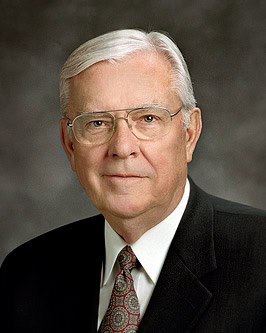 Doctrine of Inclusion
Doctrine of Inclusion
Then Jesus delivered His final instruction to the lawyer—and to all who have read the parable of the good Samaritan: “Go, and do thou likewise”. Every time I read this parable I am impressed with its power and its simplicity. But have you ever wondered why the Savior chose to make the hero of this story a Samaritan? There was considerable antipathy between the Jews and the Samaritans at the time of Christ. Under normal circumstances, these two groups avoided association with each other. It would still be a good, instructive parable if the man who fell among thieves had been rescued by a brother Jew. His deliberate use of Jews and Samaritans clearly teaches that we are all neighbors and that we should love, esteem, respect, and serve one another despite our deepest differences—including religious, political, and cultural differences. That instruction continues today to be part of the teachings of The Church of Jesus Christ of Latter-day Saints. In enumerating the key doctrines of the restored Church, Joseph Smith said, while “we claim the privilege of worshiping Almighty God according to the dictates of our own conscience,” we also “allow all men the same privilege, let them worship how, where, or what they may”. Thankfully, many of our members understand this doctrine and live it during the course of their daily lives. I recently read a news account of a tragic death in a community here in Utah. A grieving young widow was quoted: “We’ve been overwhelmed by support. We’re not Mormon, but the local ward here has been all over us with meals and help and words of comfort. It’s been a total outpouring of love, and we appreciate it”. That’s just as it should be. If we are truly disciples of the Lord Jesus Christ, we will reach out with love and understanding to all of our neighbors at all times, particularly in times of need.
 The First Great Commandment
The First Great Commandment
There is almost no group in history for whom I have more sympathy than I have for the eleven remaining Apostles immediately following the death of the Savior of the world. I think we sometimes forget just how inexperienced they still were and how totally dependent upon Jesus they had of necessity been. To them He had said, “Have I been so long time with you, and yet hast thou not known me … ?” But, of course, to them He hadn’t been with them nearly long enough. Three years isn’t long to call an entire Quorum of Twelve Apostles from a handful of new converts, purge from them the error of old ways, teach them the wonders of the gospel of Jesus Christ, and then leave them to carry on the work until they too were killed. Quite a staggering prospect for a group of newly ordained elders. Especially the part about being left alone. Repeatedly Jesus had tried to tell them He was not going to remain physically present with them, but they either could not or would not comprehend such a wrenching thought. Mark writes: “He taught his disciples, and said unto them, The Son of man is delivered into the hands of men, and they shall kill him; and after that he is killed, he shall rise the third day. “But they understood not that saying, and were afraid to ask him.” Then, after such a short time to learn and even less time to prepare, the unthinkable happened, the unbelievable was true. Their Lord and Master, their Counselor and King, was crucified. His mortal ministry was over, and the struggling little Church He had established seemed doomed to scorn and destined for extinction. His Apostles did witness Him in His resurrected state, but that only added to their bewilderment. As they surely must have wondered, “What do we do now?” they turned for an answer to Peter, the senior Apostle. . . To which Jesus responded (and here again I acknowledge my nonscriptural elaboration), perhaps saying something like: “Then Peter, why are you here? Why are we back on this same shore, by these same nets, having this same conversation? Wasn’t it obvious then and isn’t it obvious now that if I want fish, I can get fish? What I need, Peter, are disciples—and I need them forever. I need someone to feed my sheep and save my lambs. I need someone to preach my gospel and defend my faith. I need someone who loves me, truly, truly loves me, and loves what our Father in Heaven has commissioned me to do. Ours is not a feeble message. It is not a fleeting task. It is not hapless; it is not hopeless; it is not to be consigned to the ash heap of history. It is the work of Almighty God, and it is to change the world. So, Peter, for the second and presumably the last time, I am asking you to leave all this and to go teach and testify, labor and serve loyally until the day in which they will do to you exactly what they did to me.”
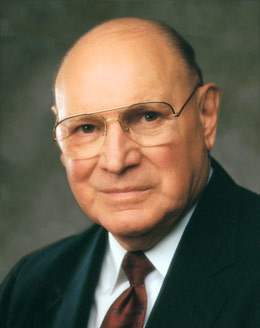 The Great Commandment
The Great Commandment
What quality defines us best as members of The Church of Jesus Christ of Latter-day Saints? I would answer: we are a people who love the Lord with all our hearts, souls, and minds, and we love our neighbors as ourselves. That is our signature as a people. It is like a beacon to the world, signaling whose disciples we are. At the final day the Savior will not ask about the nature of our callings. He will not inquire about our material possessions or fame. He will ask if we ministered to the sick, gave food and drink to the hungry, visited those in prison, or gave succor to the weak. When we reach out to assist the least of Heavenly Father’s children, we do it unto Him. That is the essence of the gospel of Jesus Christ. If we wish to learn truly how to love, all we need to do is reflect on the life of our Savior. When we partake of the sacramental emblems, we are reminded of the greatest example of love in all the world’s history. “For God so loved the world, that he gave his only begotten Son.” The Savior’s love for us was so great that it caused “even God, the greatest of all, to tremble because of pain, and to bleed at every pore.” Because the Savior laid down His life for us, we have a brightness of hope, a confidence and security that when we pass from this worldly existence, we will live again with Him. Through the Atonement of Jesus Christ, we can be cleansed of sin and stand as partakers of the gift of our Almighty Father. Then we will know the glory that God “hath prepared for them that love him.”
 The Inconvenient Messiah
The Inconvenient Messiah
I wish to speak this morning of the demands of discipline and discipleship, of the responsibilities we have to face when we choose to follow Jesus Christ. In the Savior’s life and in ours, Satan counters such discipline with temptations of an easier way, with an offer of “convenient Christianity.” It is a temptation Jesus resisted, and so must we. Life was very inconvenient for him, and, unless I miss my guess, it will often be so for you and for me when we take upon us his name. Frankly, I would prefer to speak with you individually about such temptations. I would be thrilled if there were a way to have that kind of personal moment with you. Because that doesn’t seem possible, let me generalize as best I can and let you make some application in your life the best you can. Probably the most easily recognizable kind of evil is that which simply rebels openly against heaven, as Satan rebelled before the world was—willful, wanton opposition to God. From Cain through Caligula down to today’s domestic and international hostilities, Satan has attempted to lure children of promise into violent, destructive rejection of the gospel and its teachings. These are harsh sins which the world has known only too well. But there is another, more subtle tactic used by the Primeval Turncoat which is not so violent, not so vengeful, and at first glance not so vicious. But, ah—there’s the rub. Because Christ and his disciples—Satan’s most important and necessary targets—would never seem to be attracted by flagrant, raging wrongdoing, this second approach becomes all the more sinister. It comes in the siren’s song of convenience. It says to every would-be Christian—Enjoy! Surely fluttering somewhere over the highway to hell is the local chamber-of-horrors banner reading, “Welcome to the ethics of ease.”
 “In Him All Things Hold Together”
“In Him All Things Hold Together”
Jesus, our guide and model, had a perfect guide and model himself: Then answered Jesus and said unto them, Verily, verily, I say unto you, The Son can do nothing of himself, but what he seeth the Father do: for what things soever he doeth, these also doeth the Son likewise. Just what Jesus saw “the Father do,” including premortally, we do not know, but Jesus was the perfect pupil and he had a Perfect Teacher! Each of us is at a particular point in the journey, having “come thus far.” However, if we are deflected from this journey, we will, instead, become estranged from Christ: For how knoweth a man the master whom he has not served, and who is a stranger unto him, and is far from the thoughts and intents of his heart? If we are not serving Jesus, and if he is not in our thoughts and hearts, then the things of the world will draw us instead to them! Moreover, the things of the world need not be sinister in order to be diverting and consuming. For the serious disciple, the cardinal attributes exemplified by Jesus are not optional. These developmental milestones take the form of traits, traits that mark the trail to be traveled. After all, should not Latter-day Saints have a special interest in what is required to become a Saint, virtue by virtue and quality by quality? Hear the words of King Benjamin: And becometh a saint . . . submissive, meek, humble, patient, full of love, willing to submit to all things which the Lord seeth fit to inflict upon him. These attributes are eternal and portable! Being portable, to the degree developed, they will go with us through the veil of death, and still later they will rise with us in the Resurrection when all else stays behind. Meanwhile, so much of our time is ironically devoted to learning and marketing perishable skills that will soon become obsolete. It isn’t just the morticians who will have a vocational crisis in the next world, brother and sisters.
